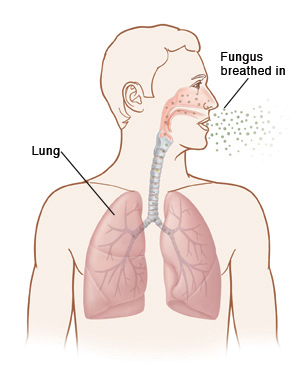Pulmonary (Lung) Histoplasmosis
What is pulmonary histoplasmosis?
Pulmonary histoplasmosis is an infection caused by a fungus called Histoplasma capsulatum. Parts of the fungus, called spores, are inhaled into the lungs. This fungus can be found in soil or other material with bird or bat droppings. In the U.S., it is most common in the Mississippi and Ohio River valleys. People who have serious problems with this disease are:
 |
| Spores from histoplasmosis are inhaled into the lungs. |
What are the symptoms of pulmonary histoplasmosis?
Many people with this lung infection have no symptoms. Often the diagnosis is first suggested by a chest X-ray done for another reason. If symptoms do occur, they may include:
How is pulmonary histoplasmosis diagnosed?
You may have 1 or more of these tests:
-
Blood and urine tests. These may help diagnose the problem.
-
Sputum cultures. These are done to check mucus that is coughed up from the lungs for the fungus.
-
Imaging tests. These can include a chest X-ray, CT scan, or MRI scans of the lungs.
-
Biopsy. Small samples of lung tissue are taken and checked for the fungus.
How is pulmonary histoplasmosis treated?
Many people don't need treatment. The infection may go away on its own. Depending on how severe the infection is, you may be prescribed antifungal medicines. These will either be given by IV (intravenously) into a vein or taken by mouth (oral). You may need to take the medicines for months. Your healthcare provider can tell you more about your condition, treatment, and what to expect.
Can pulmonary histoplasmosis be prevented?
You can reduce your risk of exposure to this infection. Stay away from places with large amounts of bird or bat droppings. If you need to work in these areas, wear a protective breathing mask.
When to call your healthcare provider
Call your provider right away if you have any of these:
-
Fever of 100.4°F (38.0°C) or higher, or as advised by your provider
-
Coughing up blood
-
Cough that won't go away
-
Shortness of breath
-
Fatigue
-
Loss of appetite and weight loss
-
Symptoms that don’t get better with treatment
-
New symptoms or symptoms that get worse
Call 911
Call 911 if these symptoms occur:
-
Trouble breathing or wheezing
-
Chest pain
-
Shortness of breath that doesn't get better with treatment
-
Unable to speak or talk
-
Skin or lips look blue, purple, or gray in color
-
Feeling faint or dizzy
-
Feeling of doom
Online Medical Reviewer:
Heather M Trevino BSN RNC
Online Medical Reviewer:
Marianne Fraser MSN RN
Online Medical Reviewer:
Sravani Chintapalli
Date Last Reviewed:
4/1/2024
© 2000-2025 The StayWell Company, LLC. All rights reserved. This information is not intended as a substitute for professional medical care. Always follow your healthcare professional's instructions.